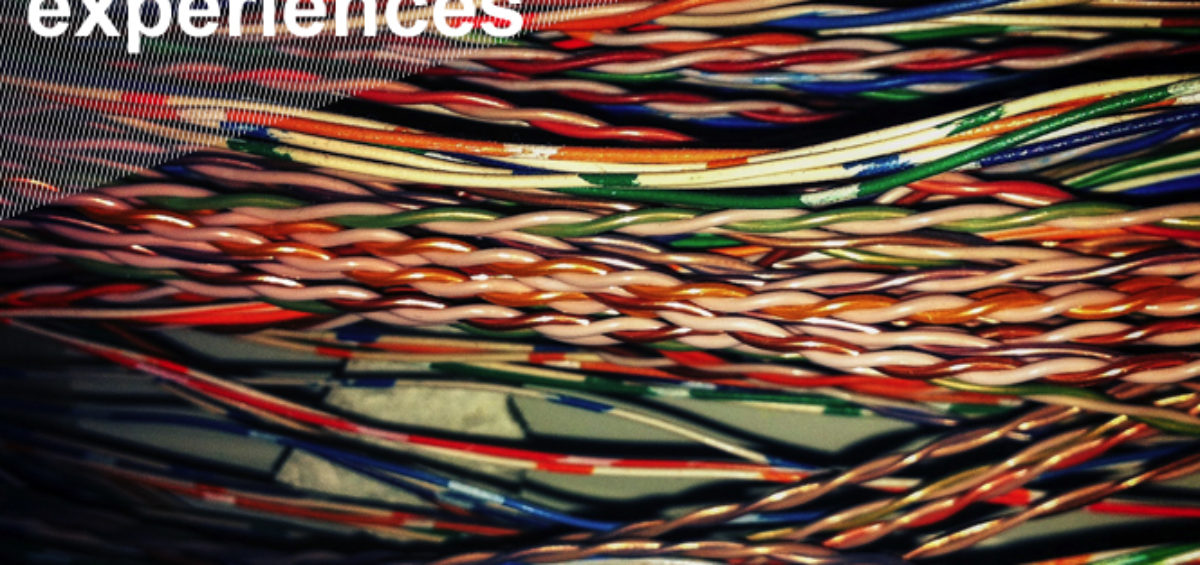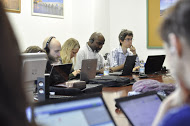By Antonia Silvaggi, Federica Pesce and Steve Bellis
Melting Pro (Antonia Silvaggi and Federica Pesce) and Storypoint (Steve Bellis)
/Teaching experience
How to use Digital Storytelling to develop cultural managers’ employability in challenging times
Introduction
This article aims to discuss the use of the digital storytelling (DS) methodology mutated from the StoryCenter methodology to increase cultural managers’ employability. The article starts with the importance of developing soft skills to enter the job market and the potentiality of a digital curricular story to actually show them to a future employer. It follows with the importance of digital storytelling as a tool of self awareness of competences acquired. We finally discuss the ways in which digital storytelling can play a role in up-skilling 21st century professionals with screen literacy tools and the ability to listen to the voices of others.
Telling your professional story digitally: the importance of soft skills for employability in the cultural sector
By Antonia Silvaggi
One of the main challenges of the cultural sector is employability. Cultural managers find it very hard to find a stable job. Though highly qualified – at least with a university education level, students find it very difficult to enter the job market. The reasons are many and relate to the sector’s limited resources, decreasing public funds, mismatching of competencies, etc. It’s “a demand led market, with considerably more applicants than job opportunities” (CREA.M research, 2012). Since cultural managers are asked to deal with complexity, run efficient and sustainable organisations and, at the same time, they are required to be relevant to society, recent research carried out in the framework of European projects such as CREA.M, ADESTE and ARTS highlight the importance of developing soft skills or transferable skills supporting the candidates to a competitive advantage in seeking job opportunities. Research highlights the need to develop soft skills and attitudes and/or attributes[1] such as being curious, open, eager to learn, open-minded, collaborative, proactive, responsible, socially skilled and fitting well with teams (including team-working skills) – to name a few – and develop an entrepreneurial mindset to boost the candidate’s employability. The Recommendation of the European Parliament and of the Council of 18 December 2006 on key competences for lifelong learning argues that since “globalisation continues to confront the European Union with new challenges, each citizen will need a wide range of key competences to adapt flexibly to a rapidly changing and highly interconnected world”.
The European Qualifications Framework (EQF), adopted in 2008, is a translation device to make national qualifications more readable across Europe, promoting workers’ and learners’ mobility between countries and facilitating their lifelong learning, shifts the focus away from the traditional approach, which emphasises learning inputs (e.g. length of a learning experience, type of institution), to learning outcomes (EC, 2008). The EQF classifies learning outcomes into knowledge (facts, principles and concepts), skills (cognitive and practical) and competences (such as ability to take responsibility and show autonomy). “In the EQF, skills are described as cognitive (logical, intuitive and creative thinking) and practical (manual dexterity and the use of methods, materials, tools and instruments). Competence means the proven ability to use knowledge, skills and personal, social and methodological abilities in work or study situations (…) [it] is described in terms of responsibility and autonomy” (EC, 2008).
In 2011 together with other colleagues we set up our own organization, Melting Pro, with the vision of increasing cultural participation. To reach this goal, one of the main means we have been applying is developing innovative training and educational experiences for cultural managers at the beginning of their careers but also as a means for professional development. In such a challenging context as it is Italy, developing an enterprise was one of the solutions for us to enter the job market, and by setting it up we learnt a lot. Thus, in our experience, informal learning settings proved to be crucial for the development of one’s self in personal and professional terms. Along these years, the questions we have been trying to ask ourselves are: how can a potential job seeker in the cultural sector show to a future employer these soft skills, maybe even before an interview or a practical experience? If soft skills are so important, how can you demonstrate how creative you are, how good you are working in teams, how passionate, curious you are, how you solve problems? How can you show that “proven ability” that was mentioned before when talking about competence? How can you demonstrate the skills and competences acquired in informal settings?
Trying to give an answer to those questions, we have been testing the digital storytelling methodology with cultural managers “to be” and also with those in the middle of their careers, to help them tell their professional story and create what we called a “digital curricular story”. We found out how important the process of self-reflection is, and to know what you are good at, what and why you do it, as well as how you acquired your skills. During the European project KVALUES (Key competences projects: Validating Adult Learners’ Educational Experiences), we came up with some hints and tips to develop the perfect digital curricular story (Melting Pro, 2014). The digital story produced is also easy to share and can be easily understood across countries. Of course, a more in depth research should be carried out to determine if this method really helps cultural managers to increase their employability. Also, one of the main lessons learnt from KVALUES was that the digital storytelling methodology should be embedded in a balanced competences path to be more effective.
Watch some digital curricular stories here.
Who am I? Toward self-assessment of competences
By Federica Pesce
The first crucial step for the validation of skills is self-awareness. Without an understanding, at first hand, of the skills and competences acquired in a given context, it is impossible to go through a validation process, especially when it comes to skills acquired in non-formal or informal settings. For example, those who have a work or study experience abroad, in addition to the skills acquired which are directly linked to that specific course or to that work, have developed some cross-boundary skills which are equally necessary to that specific activity. It is the case of those who go for the first time to live on their own in a foreign country, and struggle to find an apartment or a new social context, need to speak another language, cook their own food, and so on.
In addition to the understanding of the skills acquired, another hot topic is the enhancement of those skills. We are generally still far from being experts in showing the world a narrative that emphasizes our achievements, the professional experiences that have shaped who we are, the added value of which we are healthy carriers. Not by chance, in the recent years more and more attention has been placed on the need to propose methods for the self-assessment of skills, from simple questionnaires to more creative methods that engage people to think positively on their skills (appreciative enquiry method). In other words, to think of what you own, rather than the failures you have got.
Along this line, the method proposed by Melting Pro is linked to the digital storytelling, which is a process that allows people to create a short video of a few minutes, in first person, through a process of self-awareness and acknowledgement of one’s own abilities. In collaboration with European and international organizations, by means of projects financed by the European Commission (such as the above-mentioned KVALUES, and StoryA_STORY Abroad: validating and connecting experiences of working and Studying abroad through digital storytelling) – with the participation of prominent professionals including Joe Lambert (USA) and Steve Bellis (UK, co-author of this article) –, a variant of the digital storytelling method was coined. I am referring to the digital curricular story, a way to enable an increasing connection between the person and the working world – even at different levels of one’s career: from entrance into the labour market, to the betterment of one’s employment status within a company or sector.
In the words of some sector professionals, a digital curricular story is:
“a story created around a professional’s live and put into a digital form. A creative and personal tool to show skills and attitudes that complement our professional profile creating a communication (maybe digital) product to highlight a personal attitude (…) an evidence-based tool to raise the self-awareness of your own professional skills and competences focusing on a professional achievement describing your uniqueness. It’s an additional tool to complete a traditional CV (…) a video that expresses something more about your competences and skills, that you cannot show in a traditional CV. It’s a continuing process of development” (Melting Pro, 2013).
In a market such as today’s, so attentive not only to what I can do but also, and above all, to the way I do what I can do, the issue of recognition of one’s own skills should be strongly felt by everyone.
From meaning to screening: new tools for a new generation
By Steve Bellis
Why else make media than to share it with others? As lifelong consumers of broadcast media, we have learned to demand high production values from our on-screen viewing. If a show falls short of our expectations there are telephone numbers we can call to submit our complaints. Having served my time as a professional camera operator and video editor before teaching media in a UK college, my approach to digital storytelling has always been heavily influenced by the quality of the final product. I have been engaged in many robust conversations with colleagues about process versus product and I have to conclude that digital storytelling offers us both, so why not exploit both opportunities?
The digital storytelling methodology allows us to apply a measured dose of scriptwriting skills, incorporating economy, pace and dramatic question, as well as introducing the concept of visualization and pictorial flow to participants.
That’s not to say that as a facilitator working with a group of cultural staff and volunteers, I would be obsessive about the interplay between picture and sound, or the editorial flow of the piece, but these are some of the magical ingredients that make so many digital stories special. I feel it is my duty to help storytellers understand how to take command of such tools. A recent surge in user friendly video production software and media gathering equipment now allows anyone with a good smart phone, a laptop and internet connection access to digital storytelling. Digital storytellers of all ages and abilities are now successfully producing films that have the power to convey often powerful, unique, subtle and influential messages to an attentive audience. The practices of digital storytelling teach us not only to convey our own messages but to listen to and appreciate the messages of others. Otherwise ignored voices are now being listened to, as digital stories are being used to inform decision making and policy development at the highest level.
On-screen self-communication is rapidly becoming an essential tool for 21st century living. The new digital world will demand these skills as much as previous generations needed to know how to write a letter. The digital storytelling methodology allows us to apply a measured dose of scriptwriting skills, incorporating economy, pace and dramatic question, as well as introducing the concept of visualization and pictorial flow to participants. The real beauty of the form however, is in its nectar-like quality of tapping into our desire to share personal experiences. I recently facilitated a DS workshop in Spain for 37 participants, representing 7 European countries. The workshop was part of an EU-funded adult education project looking at ICT in daily life and participants were given the freedom to choose the subject matter of their own stories. In a round table evaluation at the end of the workshop, just 2 people claimed that personal narrative storytelling wasn’t for them. The other 94% said they enjoyed the whole experience and learned much from it. Furthermore, several were teachers who expressed a desire to make digital stories with learners back home.
For those with the necessary equipment, digital storytelling and personal narrative media can now be taught entirely online, using video tutorials and online video conferencing techniques. One website offering such a service is www.storypoint.co.uk. Services such as this now allow teachers of any subject to effectively use the flipped classroom technique to deliver elements of their curriculum through the medium of digital storytelling. As advances in technology simplify the processes involved, the door opens to an even greater take up of digital storytelling around the world. The democratic nature of storytelling and the availability of digital tools will see a more diverse mix of projects, stories and learning opportunities in the years to come.
Questions for further discussion
- What are the skills and competences that a cultural manager should improve to face emerging challenges?
- What skills, competences and attributes are influential in our field?
- How can we firmly embed digital storytelling into continuing professional development (CPD) and curricular programmes?
- Where do the boundaries lie in the use of personal storytelling in the workplace?
- How to use digital storytelling in your sector?
References
CREA.M-Creative Blended Mentoring for Cultural Managers (2012) A new framework for the profiles of managers of arts and culture. http://culturalmanagers.com/wp-content/uploads/2.-New_curriculum_framework_EN.pdf
CUENCA, M. and MAKUA, A. (2014). REPORT: European Standard Occupational Profile of the Audience Developer. ADESTE Project. http://www.adesteproject.eu/report-european-standard-occupational-profile
DUNFORD, M; JENKINS T. (2015) Understanding the Media Literacy of Digital Storytelling. Media Education Research Journal, 5 (2), 26-41.
DUNFORD, M.; ROOKE, A. (2014) Extending Creative Practice. In: Gregori-Signes, C. and Brigido-Corachan, A. (eds.) Digital Storytelling: Appraising Digital Stories across Disciplines and Cultural Contexts (pp. 205-221). Valencia: Universitat de València.
EC-EUROPEAN COMMISSION (2008) Descriptors defining levels in the European Qualifications Framework (EQF) https://ec.europa.eu/ploteus/en/content/descriptors-page
JENKINS, T. (2015) Digital Words of Wisdom? Cultural Science. 7 (2) September 2015. Available at: http://cultural- science.org/journal/index.php/culturalscience/article/view/115
MELTING PRO (2013) Digital curricular stories for all, Tools and guidelines for adult educator. http://meltingpro.org/wp-content/uploads/2013/04/tool6.pdf
MELTING PRO (2014). Tips and hints for the perfect digital curricular story. http://meltingpro.org/wp-content/uploads/2013/04/Tips-on-digital-curricular-story.def-copia.pdf
MELTING PRO (2016) Travelling Stories Digital storytelling with young people studying and working abroad. http://meltingpro.org/wp-content/uploads/2016/03/Travelling- Stories_StoryA.pdf
PESCE, F.; SILVAGGI, A.; DE ANGELIS, L.; ROMANO, M.; BRAGA, P. (2014) Civil participation through Digital Storytelling to enhance lifelong learning. Pixel proceedings, June 2014.
RIBEIRO, S. (2016) Developing intercultural awareness using digital storytelling. Language and Intercultural Communication, 15 (4), 1-14.
[1] In addition to the concepts of knowledge, skills and competences, there are other frameworks that incorporate further concepts. For instance, the European framework for key competences includes the notion of “attitude” and the Creative Blended Mentoring for Cultural Managers (CREA.M) project (2012) uses the idea of “personal attributes” (Cuenca & Makua, 2014).
Antonia Silvaggi, project manager and researcher for Melting Pro Laboratorio per la cultura (Rome, Italy). She has extensive experience in working in international projects on audience development, cultural participation and digital storytelling. Since October 2015, she has been co-opted on to ENCATC’s Board to work on an audience development special project. This is her digital curricular story.
Federica Pesce designs and coordinates national and international cultural projects related to informal lifelong learning and to the development of territories through multimedia technologies. Her present challenge is to transform information into knowledge relying on digital storytelling techniques and social design practices. Her passion to put together different but complementary people is translated into the creation and the handling of international partnership within the working environment. She is also member of the Rome Co-Design Jam group.
Steve Bellis is a teacher of media in the UK and the Director of Storypoint, an online digital storytelling academy. He has taught digital storytelling for more than 12 years, both in the classroom environment as well as in workshops around the world.
Melting Pro. We are active in the field of arts and culture to promote innovative projects and support professionals in their developmental paths and growth. The European and international dimension is the key component that qualifies our work method and the services we offer. We are inspired by international operating models. We establish a dialogue and cooperate with different organisations in order to develop effective solutions and innovative answers to the typical issues of the sector: opportunities and change. Melting Pro has a dual soul: Laboratory for Culture and Learning. Melting Pro is part of ENCATC, NEMO and Culture Action Europe. www.meltingpro.org
Header image: Networking by Andrew Malone on Flickr// CC BY-NC-SA 2.0









